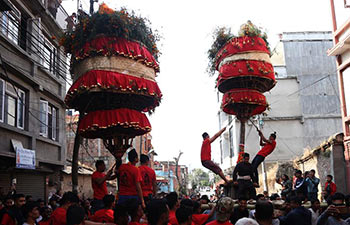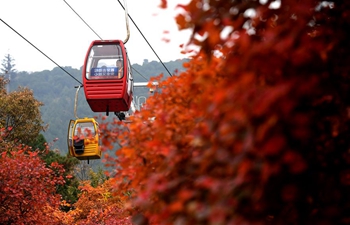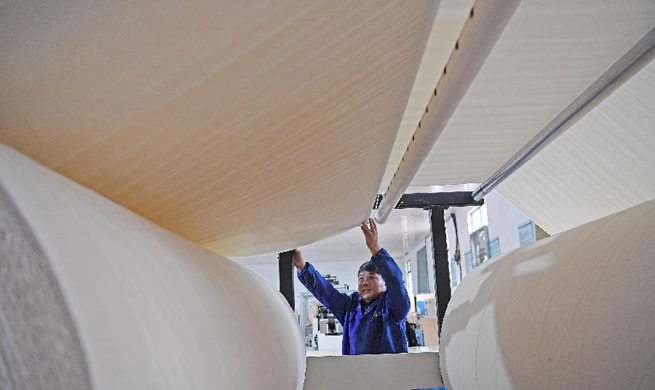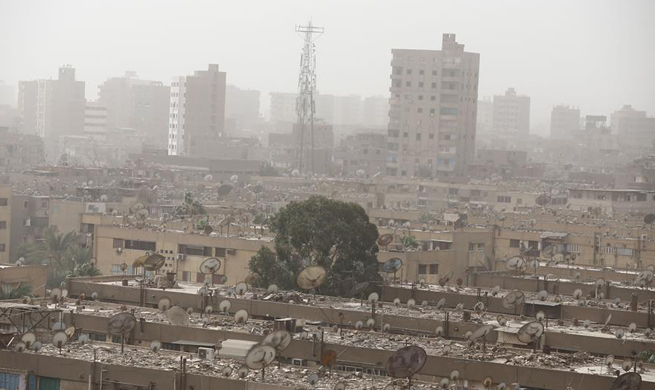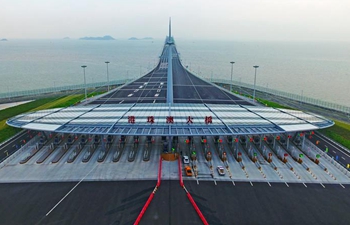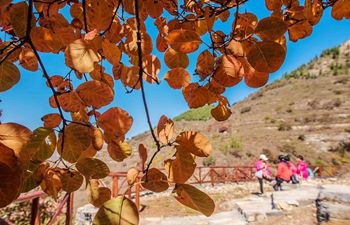by Luis Brito
HUIXTLA, Mexico, Oct. 25 (Xinhua) -- It's still dark as thousands of people crowded onto the main street of Mexico's small southern town of Huixtla before sunrise, preparing to continue their northward march to the U.S.-Mexico border.
The Central American migrants, mainly Hondurans fleeing poverty and violence, spent the night sleeping in parks and plazas, and agreed to meet up again at 4:00 a.m. to resume their cross-country quest.
Thursday marks the fourth day of the migrant caravan's journey through Mexico. The caravan made its way across the river that separates Guatemala from Mexico's southern state of Chiapas on Oct. 19.
"We calculate it could take us a month" to reach the U.S. border, said Jose Hernandez, a Honduran who organizes the group for their departure.
The caravan, still in Chiapas, has another 1,800 km to go.
The migrants were traveling light mainly on foot, having left everything behind in a desperate bid to build a better life elsewhere.
Men were carrying backpacks, while many women were pushing strollers with toddlers, some still in their pajamas.
One little girl, Marbella, was hugging a stuffed white bear. Marbella's aunt Brenda, 35, was holding her niece in one hand and her nephew, Ever, in the other.
Brenda, who set out with others on Oct. 13 from northern Honduras, could recite the names of the towns the caravan had crossed, first in Guatemala and then Mexico.
"Nobody leaves by choice, it's by necessity (that we leave)," Brenda said.
Hernandez was barking orders: no climbing onto trucks or trailers as a young member of the caravan was killed Monday after he slipped and fell on the road, and "anyone who steals from others will be handed over to the police."
Though residents were still asleep when the caravan left the town, the migrants yelled out their appreciation for the food, water and shelter received from locals, especially when it rained the night before.
Like Rosa, a migrant and mother making the trek with her four children -- three aged 10, five and two, and an infant only four months old -- many left Honduras with about 20 lempira (the local currency), which is less than one U.S. dollar.
"It was all the money I had. Halfway here, it was spent," said Rosa, 30, an unemployed factory worker.
Predawn temperatures were already hovering around 24 degrees Celsius when the long line of migrants entered a highway flanked by fruit orchards. The road leads to the next town, Mapastepec, some 68 km away.
Some sang, some chanted slogans about being workers and not criminals, as U.S. President Donald Trump has suggested. You could also hear coughing and sneezing, and children tugging at their mother's arms because they were tired. After a couple of hours of walking, groups of migrants stopped and lay down by the roadside to rest before rejoining the caravan.
Dehydration, colds, respiratory and gastrointestinal ailments, and foot sores were rife, said a Red Cross paramedic whose ambulance was accompanying the caravan. He then broke off to attend a pregnant migrant reporting stomach pain.
Soon temperatures hit 32 and the asphalt burned, leading some to defy orders and hop aboard passing trucks.
"We have put up with everything, even hunger sometimes. We are going to continue the struggle to move forward," said Keyla with two children aged six and two.
Originally comprising around 1,200 people, the caravan had expanded to nearly 8,000 people, according to the migrants, as Central Americans from El Salvador and Guatemala joined the march. Police in Huixtla said they counted 6,400 people, while Mexico's Interior Ministry said in a statement on Thursday that there were "approximately 3,630 people."
The figures may vary, but there's one thing everyone agreed on: the caravan is an unprecedented event that has raised political tensions in the region, as the United States demands Mexico stop the migrants from reaching the border. Trump has also threatened to withdraw U.S. aid to the Central American countries for failing to prevent the exodus.
Carlos Alexander, a Guatemalan, left his wife and two-year-old child, planning to try his luck in the United States.
"What we need is just a little help. This is the first time I am trying (to enter the United States) and since it was a caravan, I took advantage of it when it passed through my country," said the 22-year-old.
Rodolfo Garcia, a research professor at the Autonomous University of Zacatecas, said the migrant march challenges the United States, Mexico and Central American countries to each assume their responsibility for creating the conditions that spark mass migration.
Migration from Honduras, Guatemala and El Salvador is likely to continue, with migrants amassing in Mexico as the United States tightens immigration policy under Trump, he said.
Mexico offered migrants the option of applying for refugee status here, but only about 1,700 opted to do so.
"Given the unprecedented aspect of a caravan with thousands, we do have to concern ourselves with food, water and the health of the children. But we also have to concern ourselves with a more comprehensive solution and with ... the governments of each respective country taking shared responsibility," said Garcia, an expert on migration matters.
In the meantime, the migrants seem undeterred by either hostile immigration policy or forces of nature.
"Nothing is going to stop us," said Vianey, 18, who recently graduated from high school in Honduras.


